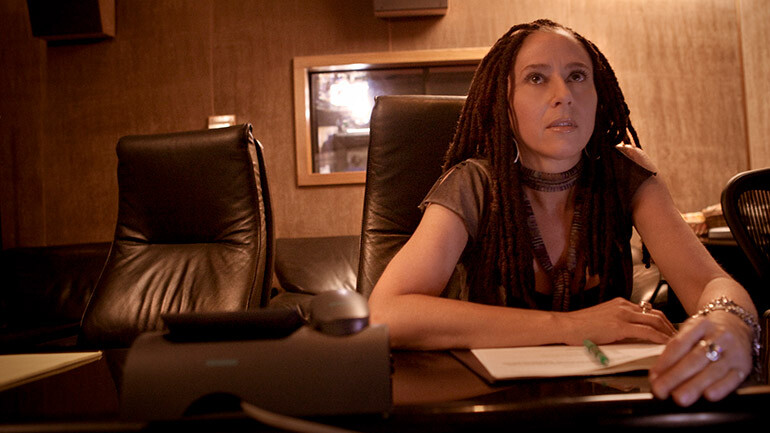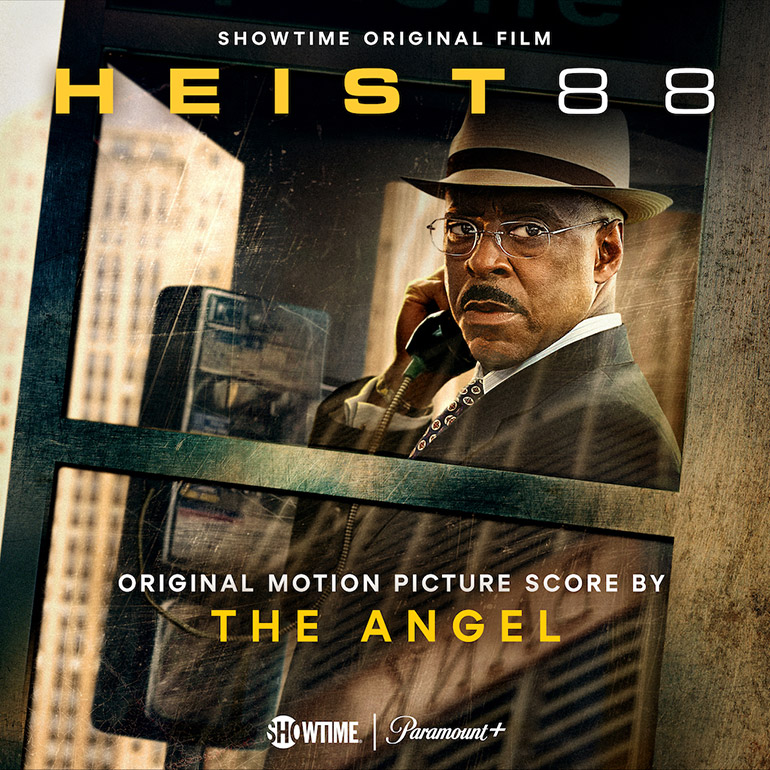A Conversation with The Angel

Having independently launched her multifaceted career as a self-taught composer, producer, remixer and recording artist, The Angel burst out of her native Brooklyn, in the early 1990’s, with a sonic signature that was all her own. With a maverick streak, The Angel made her work distinctive by blending an incredible alchemy of different genres with an analytical approach to storytelling. Her celebrated projects include Gridlock’d, Boiler Room, Kidulthood, the documentary The Heart of the Game, the TV series Hawthorne, and many others, all featuring a contemporary edge that is impossible to ignore.
The album for her recent score to Showtime’s acclaimed original film, Heist 88, drops on November 1. On the eve of this album’s release, BMI caught up with The Angel to learn more about her amazing career and creative process.
Here’s what she had to say.
Was there a particular piece of music that first inspired you and set you on your path to be a music creator?
Not a particular piece, but I think the fact that I mix and blend genres so naturally in my work comes from my appreciation of the breadth of music I listened to and loved, growing up. I would tap into and hum along with bass lines, horn sections, or guitar riffs as much as the vocals. Given my mom’s eclectic record collection, ranging from The Beatles to Earth Wind & Fire, Isaac Hayes, Sergio Mendes, Pink Floyd, Sly & Robbie, Cal Tjader, Miles Davis, Miriam Makeba, Milton Nascimento, Queen, and Stephen Sondheim, perhaps it was inevitable that music would play a very central role in my life.
Prior to your work in film composition, you gained invaluable experience as an artist, a record producer, and a DJ, working across a wide array of genres. Is there a single one of these disciplines you feel particularly comfortable in?
Hands down, I’m most comfortable in the studio as a record producer rather than touring or being on stage. Even though, as an artist, I’ve played gigs with an eight-piece band and did DJ/artist sets at events like the first ever Coachella, SXSW and Montreal Jazz Festival.
In the early days, I taught myself how to use the technology to allow me to write, program, arrange, engineer and mix all of my records and create my own sound. It wasn’t until years later that I realized I was also doing the job of a “record producer.” And since then, all of the skills I’ve amassed as a record producer have served me very well in working to picture.
What is your creative process like?
My creative process is fluid. Ideas and inspiration come to me even when I’m not in the cutting room, studio or on a deadline. Songs often begin as a stream of consciousness, where I’m building from the music up… Once I’ve created an atmosphere and a feeI, I’m inspired to write lyrics and toplines.
But when I’m scoring projects, there are so many considerations that make my process more methodical and analytical because it’s my job to fulfill my director’s or showrunner’s vision. I spend time absorbing everything from the script to what they share with me about tone and style, so I have a clear picture of what I’m aiming for. If they’re still shooting as I’m being hired, which was the case with my recent feature film, Heist 88, I’ll begin working to dailies or rough assemblies because my creative process is fully activated by the cinematography and the style of the editing. This is where I begin building a specific sonic palette and work in a very nuanced and detailed way to picture.
Director Menhaj Huda had me tap into some of the sounds of 80’s club music for a driving, thematic electronic score, to take into account a storyline centered on a house music DJ/record label owner in 1988 Chicago. Because the film is loosely based on one of the largest bank heists in US history, I researched the case so I could get further inside the head of our criminal mastermind, played by Courtney B Vance. His character is constantly playing three-dimension chess; outwitting and manipulating others to bend to his will. And from that standpoint, I built in a fair amount of intrigue into intricate, dense themes for him, to illustrate just how much was going on in his mind at any given time. On procedural drama series, I’ve jumped through every stylistic hoop in the book. So, I have all of these things, including the marketing in the back of my mind, when I’m prepping to score film and TV.
But the real magic comes when I begin writing to picture… I work under and around dialogue, catching camera moves and the actors’ micro expressions as I build layers of sounds, rhythm and melody. In this part of my creative process, I tend to follow my gut, almost channeling the music from the ether, always working from a place of ”feel” rather than being too cerebral. It’s only when I’m asked a question like this, that I’ll stand back and analyze it in this way. And this applies not only to creating music, which comes naturally, but to my screenwriting and film producing as well.
Was composing for film and television always an ambition of yours? How did that passion begin?
As soon as I spent my first day working to picture, this became my greatest passion. I never dreamed that I would one day become a composer for film and television. So, I’m grateful that by recording and releasing records, my sound caught the ear of studio film music executives and filmmakers like Ben Younger, the director of New Line’s classic, Boiler Room and Vondie Curtis-Hall, director of Polygram’s Gridlock’d. These creatives sought me out and set me on my path to becoming a film and television composer.

Tell us a little bit about how Heist 88 came about.
Director Menhaj Huda and I first worked together on an independent feature film-turned British classic, Kidulthood, in 2006. Before he hired me, he knew exactly what he wanted, which was someone who came from producing hip, underground, beat-driven music, who understood UK hip hop and grime and who also had the proven skills to score a movie… I had lived in London for many years before landing in LA, so by the time we finished our long-distance meeting, he knew that I was exactly the person to execute his vision.
Five projects later, as soon as Menhaj was hired to direct the Showtime/Paramount+ feature film, Heist 88, he called to say he thought this would be a great project for us to work on together and I couldn’t have agreed more. I had quite a ride scoring this one! And what’s especially nice about the entire experience is that once the film was done, Paramount expressed interest in releasing the Heist 88 (Original Motion Picture Score Album). Knowing that I have my own record label, they’ve given me the rights to release the album on Supa Crucial Recordings on November 1st.
What advice do you have for music creators looking to emulate your remarkable path?
I’m not sure that any of us can emulate another creative’s path, and mine is particularly unusual, especially because I’m self-taught and I didn’t come up under any other composer. I’d created my own sound as a record producer, released my own records, and produced and remixed other artists, like Blue Note’s Donald Byrd, Grammy Nominee Mystic and Cali legends, The Pharcyde. So, I had a body of work that was discoverable, and it led to film and TV creatives to seek me out. I couldn’t have planned this… instead organically, my film projects led me to cable and network TV. So, I encourage music creators to always be creating and to follow their passion, not the fame or the money. Composing, in particular, is one of the most difficult areas of entertainment to break into. And when you consider that women, BIPOC and LGBTQ+ creatives represent a very small percentage of all working composers in film and TV worldwide in 2024, it’s clear that you have to make your mark and find a way to distinguish yourself within this crowded field. With all the tools available to create music at a very high level, in your own space and on your own terms, you can show the world what you can do!
What’s next for you?
I’m thrilled to have produced and scored the feature documentary, Lives Beyond Motion, centered on thirty-three celebrated men in contemporary dance including Bill T. Jones, Guggenheim Fellow Lar Lubovitch, Alvin Ailey Associate Artistic Director, Matthew Rushing and MacArthur Genius, Kyle Abraham. This legacy film is a blissful, love letter to every creative across the arts, beginning its festival run with an LA Premiere at Dance Camera West in January 2025 with my score album dropping at the same time.
I’m also scoring the feature documentary Velvet Vision about the iconic gay filmmaker, James Bidgood, and his path to directing his 1971 arthouse feature film Pink Narcissus, which for years was mistakenly attributed to Andy Warhol and Kenneth Anger. It is a deep dive into Jim’s unparalleled artistry, while struggling with mental illness and addiction. Beyond these, I am writing, developing and producing projects.
What role has BMI played in your professional career, so far?
I’ve been a member of BMI since the 90s and over the years have appreciated being part of a wonderful community of composers and songwriters here. Through the Film, TV and Visual Media department’s many events, I’ve been a panelist on the BMI/Billboard’s composers’ panel, attended Sundance gatherings as well as the annual industry catch up at the BMI Film, TV & Visual Media Awards, which is always a bit of a lovefest.
In 2014, at the old BMI offices on Sunset, Doreen Ringer Ross facilitated a gathering of women composers and encouraged us to build our own community and find a way to bring more attention to the fact that we are all so terribly marginalized in this craft. Out of that gathering, the Alliance For Women Film Composers was born, and has grown to become a significant international alliance. And now, it is great to see that Tracy McKnight is carrying that torch by continuing to shine a light on women composers and fostering camaraderie amongst all BMI composers, their reps, music supervisors and studio executives.
Find out more about Heist 88 (Original Motion Picture Score Album) by clicking here.






Community
Connect with BMI & Professional Songwriters